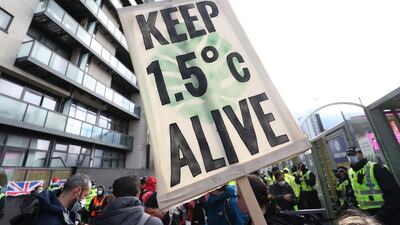The UN Climate Change Conference held in Glasgow in the second half of last year was designed to be era-defining.
However, the twin ruptures of the European energy market by the war in Ukraine and the supply-side crisis that has awakened the beast of inflation threaten a very different new era. Both pressures have erupted since the conference and could derail the hopes that were created in Scotland's second-largest city.
At the heart of the summit – known as Cop26 – was a new approach that mobilised the power of financial resources to ensure that the world economic system corrected course before it was too late to save the planet.
Mark Carney, the UN Special Envoy for Climate Action and Finance, spoke last week about how there could be no question of making a choice between the climate and living standards in the here and now. “The climate doesn’t care why emissions happen, only how much occur,” Mr Carney said. “The more we emit now, the more radical action will be needed later. We need to speed up, not slow down.”
The International Energy Agency, noting that Glasgow brought on board big finance, projected that Cop26 would put the world on track for limiting the rise in global temperatures to 1.8°C. That overshoots the scientists’ target of 1.5°C but puts the world within reach of further measures to bring further progress, not least at the Egypt and UAE climate summits at the end of this year and next, respectively.
Since the outbreak of the Ukraine conflict there has been a rush to find more natural gas supplies from anywhere outside of Russia. When energy prices shot up, there was a notable return to coal to make up part of the supply mix, even in the most climate-virtuous countries.
Germany, for example, was getting almost one-third of its electricity from coal-fired plants for most of the first quarter of 2022. There is no getting away from the fact that emissions are rising just now, and that is unhelpful.
Can the financial kings find a way to keep on track? Banks that backed Mr Carney are facing shareholder revolts over their green investment transformation plans. Energy producers are once again using more capital to expand output as well as balancing the mix of their business with renewables and hydrogen.
The Glasgow Financial Alliance for Net Zero (GFANZ) was set up as a mechanism to achieve this, and its portability to transform investment was rooted in the support of firms with $130 trillion under management.
Notable absentees from the roster of backers are buy-out specialists and private equity firms, which face less public scrutiny of their decisions anyway. So Mr Carney continues to woo a larger pool of capitalists to join his push.
In recent months, the former UK and Canada central bank governor, has also sought to set up mechanisms to shape the transition. Members are expected to adopt net-zero principles of transparency and to account for compliance with the UN principles.

Mr Carney argues that only the financial markets can generate the resources for developing countries to undergo the transition away from the carbon economy.
Establishing a framework that allows firms to work with governments to develop the big projects that make an impact and catalyse change is also one of the key challenges for GFANZ.
Country-level platforms could be a mechanism to develop these big market-backed projects. Developing more organised work between international development banks and the financial firms in pursuit of climate goals must also be a priority. Reporting mechanisms to allow the secondary markets to verify this work are also being worked out.
Furthermore, Mr Carney is urging scientists in the field to come up with a pathway for the oil and gas sector to start meeting goals and working within limits for fossil fuel financing. He has challenged the Science-Based Targets Initiative to come up with a comprehensive plan that his members can work with soon.
It is notable that when Russian President Vladimir Putin called together the biggest businesses in his country after the start of the Ukraine war, he singled out climate change as one area where co-operation with the West could continue.
The scale of western sanctions on Russia no doubt blindsided the Kremlin leader and its captains of business almost as soon as that meeting wrapped up.
For his part Mr Carney says Ukraine cannot be used as an excuse to defer climate goals. The costs that the climate crisis will impose, if it intensifies, will be even larger than the current squeeze. He also adds that the Russian move shows the need for a more resilient system that has been built on the principle of diversified supply and with a priority on ensuring the security of the system.
The message is that the present can be strengthened but that resources must grow for future-proofing, too.
The Cop26-led financial strategy is being severely tested at the moment. Its success will be key to the task of keeping developing countries and their rich-world counterparts together in the summits of the future.


